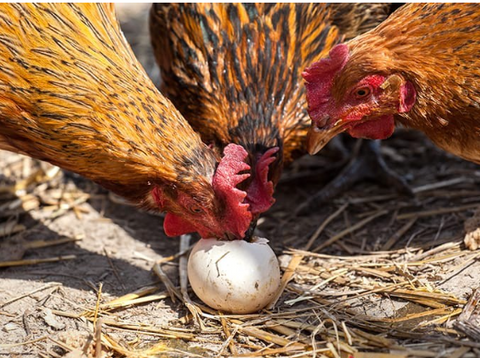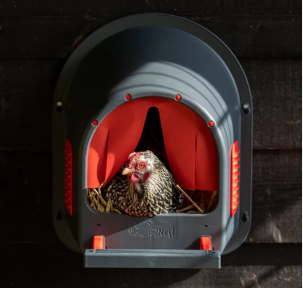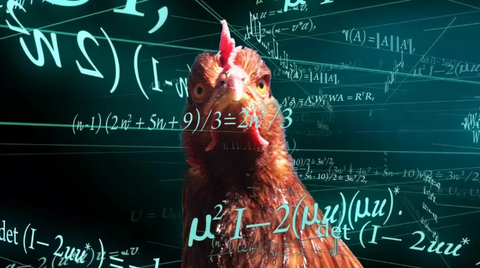Chickens Eating Eggs? 9 Ways to Prevent or Stop It
Are your chickens eating their own eggs? Once a chicken starts eating eggs, it can be a very bad and difficult habit to break. Especially if they teach their friends to do it too!
Read along to learn how to prevent and stop chickens from eating their own eggs. Egg-eating isn’t as unnatural as you think – chickens sometimes eat their own eggs in the wild! Yet it can also be a signal that there is a serious issue in your backyard flock, and therefore shouldn’t go ignored. Egg-eating can also make a big sticky mess of their nesting box or feathers, and attract pests. If you rely on fresh eggs as a source of self-sufficient food or income, having an egg-eating chicken in your flock can be detrimental!
9 Ways to Stop Chickens from Eating Their Eggs
1) Assess their diet
Chickens eating eggs could be a sign that they are experiencing a nutritional deficiency or imbalance. Eggs are loaded with protein, and the shells are made up of almost pure calcium. These two things are essential to a chicken’s diet and overall good health. If chickens aren’t getting enough of either, they may turn to eating their own eggs to compensate.
Ensure your chickens are consuming adequate protein by providing a chicken feed that is formulated for laying hens. Most Layer Feed contains 16 to 18% percent protein.
Also, limit treats to an occasional basis only. incorporate plenty of protein-rich treats like mealworms, sunflower seeds, or home-sprouted seeds or grains.

2) Promote healthy, strong eggshells
Laying hens need a regular supply of calcium available to them at all times. This is crucial! Because eggshells are so high in calcium themselves, laying hens need to consume a substantial amount of supplemental calcium to lay hard, healthy eggs with firm shells.
Chickens may eat eggs if they aren’t getting enough calcium elsewhere. Insufficient calcium intake can also lead to soft-shelled eggs or thin shells, which are more likely to crack – and then entice even the healthiest, curious chickens to eat eggs! Even worse, too little calcium can cause a chicken to become egg-bound. Therefore, offering additional calcium is a great way to prevent egg-eating behavior as well as illness.
Either purchase Crushed Oyster Shell Grit, or save and crush their own eggshells. Offer calcium in a dish separate from their food; they eat what they need (and too much calcium can harm them too). I know what you may be thinking… Doesn’t feeding chickens their own eggshells make them more likely to eat eggs? No, the vast majority of experienced chicken keepers say it does not. We bake and crush the eggshells before feeding them, which kills potential bacteria and also changes the odor and flavor of the shells… just in case.

3) Collect eggs often
Chickens can’t eat eggs that aren’t there! Don’t let eggs sit in the nesting boxes for an extended period of time. Collect eggs as often as your schedule permits (up to several times per day) – especially if you’re trying to break egg-eating behavior that has already developed. A big pile of eggs is just begging to be messed with, and can increase the likelihood of your chickens becoming broody. There is also a greater chance for eggs to crack and break when they’re laid on top of one another.

4) Provide cushioned nesting areas
Have you ever seen a hen lay an egg? Even though they sit down for quite a while beforehand, they stand up and squat when the egg comes out, so it has to fall several inches before it hits the ground! If the bottom of the nesting box is hard and exposed, the egg could break – and one broken egg may be all it takes for a chicken to develop a taste for them.
Line the bottom of the coop nesting boxes with soft material for the eggs to land on. if an egg does break, clean it up quickly

5) Dummy eggs in nest box
If your chickens begin to peck at their own eggs, try putting a hard dummy egg or two inside the nesting boxes. Golf balls or fake rubber eggs work well! When they go to take a peck, they’ll find the “egg” impenetrable – and will hopefully give up trying to peck the real eggs too. Placing fake eggs inside the nesting box is also an effective way to train young chickens on where to lay eggs.

6) Nest box curtains (dark or dim nesting area)
Did you know that chickens can’t see in the dark? That’s why they instinctively head into the coop to roost at dusk. So, they are far less likely to peck and eat eggs that they can’t see well. One way to darken the nesting box area is to install nest box curtains. This trick was the most successful measure to stop our chickens from eating eggs!
You can create cute little mini-curtains on rods, or do something as simple as pin old fabric napkins or cut pillowcases in front of the nest box opening.
When first installed, you may need to keep the curtains pulled or pinned partially open until your chickens get used to them. Later, we found that leaving ours completely closed was the most effective at stopping the egg eating. They push right past them to get in and out.

7) Soap and mustard
Wait, what did I just eat?! chickens hate the taste of mustard. Plus, who would want to eat soap? Not our birds. Another old trick used to stop chickens from eating eggs is to fill an empty eggshell with dish soap and mustard (which also happens to mimic the look of gooey egg whites and yolk).
Use an egg that has been pecked with a small hole, empty it out, fill it up, and put it back in the nesting box for your egg-eating chicken to try. Or, carefully blow out an egg to fill. Hopefully the nasty surprise will turn them off for good!

8) Provide plenty of space and entertainment
Keeping your flock happy and entertained is a fantastic way to both prevent and stop chickens from eating eggs. Bored, crowded, or otherwise unhappy birds are far more likely to start pecking at eggs – and each other! Provide roosts, ample space, and boredom-busters such as hanging treats, pecking blocks, chicken swings, or hanging cabbage ‘tether balls’ to keep them busy.

9) Roll-away nest boxes
A final measure to stop chickens from eating eggs is to make the eggs disappear altogether. When all else fails, you could create sloped nesting boxes where the eggs roll away and out of beak’s reach after they’re laid. I consider this a last resort – not because it is extreme, but because modifying your perfectly good chicken coop could be a pain in the butt! Yet so are egg-eating chickens… so if necessary, new-and-improved nest boxes may be the solution.


And that concludes the top tricks to prevent or stop an egg-eater.




